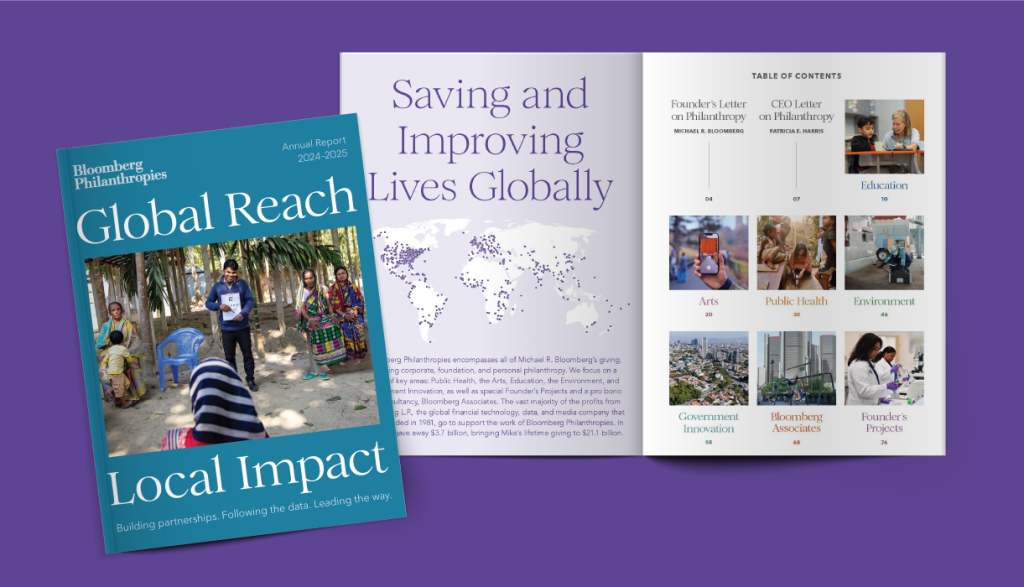MIKE BLOOMBERG
Annual Letter on Philanthropy
“Bloomberg Philanthropies follows the same mantra we adopted in New York’s City Hall: Make Every Day Count.”
Bloomberg Philanthropies follows the same mantra we adopted in New York’s City Hall: Make Every Day Count. A lost day is a lost opportunity to help others and save lives.
That’s true for every issue we tackle. When it comes to climate change, for example, Mother Nature does not wait on Father Time. In school, students who fall behind struggle to catch up, both in their studies and their careers. And across all our work, urgency is essential to getting big things done.
Nowhere is that truer than in public health, where delay can lead to death on a mass scale, because most of the world’s biggest causes of death and disease are preventable. Tragically, when they don’t get the attention and resources that are necessary to stop them, they claim lives by the millions. Bloomberg Philanthropies is devoted to changing that, by spearheading efforts to tackle the world’s most common killers, from heart disease to drowning and road crashes – and scaling and spreading solutions that work.
Recently, Bloomberg Philanthropies launched programs targeted at two public health challenges that can have debilitating, and even deadly, consequences: lead poisoning and impaired vision.
Lead poisoning is one of the world’s most prevalent and under-recognized public health problems. Exposure to lead can do lasting harm to children’s brains – and at high levels, it can even lead to death. Studies suggest that it affects one in three children on the planet. In total, that’s 800 million young people.
For adults, long-term exposure to lead can be deadly, even at low levels. Each year, up to 5.5 million people die from lead-related cardiovascular disease. To put that in perspective: More people die from lead exposure than from HIV and malaria combined. Yet in most countries, efforts to protect people from lead exposure have received relatively little support.
In the United States, eliminating lead from gasoline reduced lead levels in blood by nearly 80 percent. Lead paint, another major source of poisoning, has also long been banned in the United States and other countries. More rigorous testing of homes has helped to further protect people.
In New York’s City Hall, our administration released the first comprehensive measurement of lead exposure in children, as part of an effort that led to increased home inspections, more support for abatement, and tougher enforcement. And it worked: Cases of children testing positive for lead exposure fell by two-thirds.
Around the world, however, lead is still highly prevalent. And most countries don’t do enough testing to effectively measure the scale of the problem or pinpoint its sources.
Bloomberg Philanthropies is now working to change that by helping proven solutions spread to more countries in Africa, Asia, and Latin America, including bans on lead in paint, spices, and other sources. We are also helping governments better measure the problem and target their resources, in part by supporting an increase in blood testing. This effort is led by local organizations in partnership with international agencies, including the World Health Organization and Centers for Disease Control Foundation, and leading nonprofit organizations, including Resolve to Save Lives, Vital Strategies, Pure Earth, and the Lead Exposure Elimination Project.
This combination of resources, expertise, and local knowledge is also at the heart of our new effort to tackle impaired vision. As many as one billion people live with untreated vision problems, which can have a lifetime of consequences. For example: Children with untreated vision problems have worse outcomes in school, restricting their career options and reducing their earnings.
In most cases, poor vision can be easily fixed, and so Bloomberg Philanthropies will work with our partners to distribute millions of pairs of prescription eyeglasses, while also helping more people get needed cataract surgeries, by training surgeons to perform them, ensuring availability of medical supplies, and raising awareness of surgery as an option for fixing eyesight.
The same spirit of urgency that defines our approach to public health also shapes our work fighting climate change, improving public education, promoting government innovation, and advancing the arts. And the common denominator across all those areas is cities.
For the first time in history, cities are home to most of the world’s population, and the proportion of people that live in cities continues to grow. Cities of all sizes and in every part of the world face many of the same basic challenges. What works in one city often works in many others – so one city’s great idea has the potential to spread and improve lives everywhere. Mayors don’t have to reinvent the wheel. We saw that during our time in New York’s City Hall, where we were never shy about borrowing and adapting smart ideas from other cities.
As you will read throughout the pages of this report, Bloomberg Philanthropies helps cities and local leaders test innovative ideas – and when an idea proves effective, we work to scale and spread it. Cities can be a powerful engine for progress, and our teams at Bloomberg are like engineers and mechanics, constantly working to design engines – and refine and fine-tune them – so they are ever more powerful, allowing cities to accelerate faster and go farther.
I’m an engineer at heart – my undergraduate degree was in electrical engineering. And I’ve spent most of my career trying to build better mouse traps. That’s what led me to start a company, which has grown from four employees to more than 26,000. It’s what led me to run for mayor of New York, where we raised the bar for what cities could accomplish. And in philanthropy, it’s why I’m passionate about taking new and different approaches to seemingly intractable problems that have defied conventional solutions.
In life, success is never guaranteed, but it is always possible – if we make every day count.
Sincerely,

Michael R. Bloomberg
